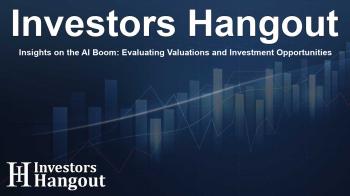Insights on the AI Boom: Evaluating Valuations and Investment Opportunities

Understanding the AI Boom and Market Valuations
Economist Justin Wolfers is voicing his perspective on the ongoing AI boom, addressing common concerns about potential market bubbles. He asserts that fears of an AI bubble may be exaggerated and contends that the high valuations in the tech sector are justifiable, reflecting a significant technological evolution.
The AI Boom: A Potential Industrial Revolution
During a recent segment on MSNBC, Wolfers characterized the AI surge as a potential "beautiful industrial revolution." He acknowledges the possibility that the market could exhibit bubble-like qualities but contends that the considerable investments seen across the landscape are indicative of genuine technological advancement. Wolfers believes that if AI can fulfill its potential, it will automate various tasks, allowing humans to engage in more creative pursuits.
The Complexity of Identifying Market Bubbles
Despite his optimistic outlook, Wolfers provides a critical alert regarding any undue conviction about the market's trajectory. He reminds us that identifying bubbles in real-time can be as tricky as looking for the peak of Mount Everest while still climbing. Wolfers eloquently pointed out that true market peaks often become evident only once you begin to descend.
Contrasting Views: Bulls vs. Bears
Wolfers’ analysis resonates with bullish sentiments from major financial institutions. For instance, Goldman Sachs has rejected bubble theories and is projecting an immense $8 trillion opportunity in the AI field, arguing that current investment levels remain sustainable.
Wedbush analyst Dan Ives famously stated that we are merely in the "second inning" of the AI revolution, emphasizing that this tech party is just getting started. Conversely, pessimistic viewpoints persist, particularly from firms like GQG Partners, which warn that the current market bears similarities to the dot-com bubble, albeit on a grander scale. They express concern over deteriorating company fundamentals that could complicate the situation.
Acknowledging Diverse Economic Conditions
Wolfers argues against both extreme perspectives. He contends that those who claim unequivocally that we are in a bubble are often mistaken. This acknowledgment comes as he discusses the unique duality in the economy, where significant AI growth masks weaknesses in other sectors. He implies that without the current AI investment surge, the economy could be on the verge of a non-AI recession.
Promising Investment Opportunities in AI-Linked Stocks
As the S&P 500 index enjoys a year-to-date increase of 13.55%, several AI-linked stocks and exchange-traded funds are outperforming this growth. Investors considering these avenues should be mindful of notable stocks and ETFs:
Top Performing AI-Linked ETFs
iShares US Technology ETF (NYSE: IYW) has shown15.58% growth year to date, while the Fidelity MSCI Information Technology Index ETF (NYSE: FTEC) has achieved a respectable year-to-date performance at about 21.07%. Several other ETFs, such as the iShares Expanded Tech Sector ETF (NYSE: IGM) and Roundhill Magnificent Seven ETF (BATS: MAGS), also present significant investment potential.
Notable AI-Associated Stocks
Prominent companies involved in AI technology have yielded impressive returns. For example, Nvidia Corporation (NASDAQ: NVDA) is up approximately 32.47% year to date, while Alphabet Inc. (NASDAQ: GOOG) has surged by around 33.13%. Other tech giants like Apple Inc. (NASDAQ: AAPL), Microsoft Corp. (NASDAQ: MSFT), and Tesla Inc. (NASDAQ: TSLA) also witnessed notable performance, reflecting the growing investor confidence in AI-driven stocks.
Frequently Asked Questions
What is Justin Wolfers' main argument about the AI market?
Justin Wolfers argues that concerns over an AI bubble may be overblown, emphasizing that high valuations could be justified due to genuine technological advancements.
How does Wolfers view the relationship between AI investments and economic performance?
He believes that while the AI investment boom is beneficial, it may also be concealing weaknesses in other sectors, indicating a complex economic landscape.
What are some of the top ETFs related to AI investments?
Top ETFs include the iShares US Technology ETF (NYSE: IYW) and the Fidelity MSCI Information Technology Index ETF (NYSE: FTEC), both showing solid year-to-date performance.
Which major companies have shown remarkable gains from AI technology?
Nvidia Corporation (NASDAQ: NVDA) and Alphabet Inc. (NASDAQ: GOOG) are among the leading companies that have achieved significant year-to-date growth driven by AI technologies.
What caution does Wolfers advise regarding current market conditions?
Wolfers warns against extreme confidence in determining market conditions, stating that true peaks often become clear only when conditions begin to decline.
About The Author
Contact Thomas Cooper privately here. Or send an email with ATTN: Thomas Cooper as the subject to contact@investorshangout.com.
About Investors Hangout
Investors Hangout is a leading online stock forum for financial discussion and learning, offering a wide range of free tools and resources. It draws in traders of all levels, who exchange market knowledge, investigate trading tactics, and keep an eye on industry developments in real time. Featuring financial articles, stock message boards, quotes, charts, company profiles, and live news updates. Through cooperative learning and a wealth of informational resources, it helps users from novices creating their first portfolios to experts honing their techniques. Join Investors Hangout today: https://investorshangout.com/
The content of this article is based on factual, publicly available information and does not represent legal, financial, or investment advice. Investors Hangout does not offer financial advice, and the author is not a licensed financial advisor. Consult a qualified advisor before making any financial or investment decisions based on this article. This article should not be considered advice to purchase, sell, or hold any securities or other investments. If any of the material provided here is inaccurate, please contact us for corrections.

